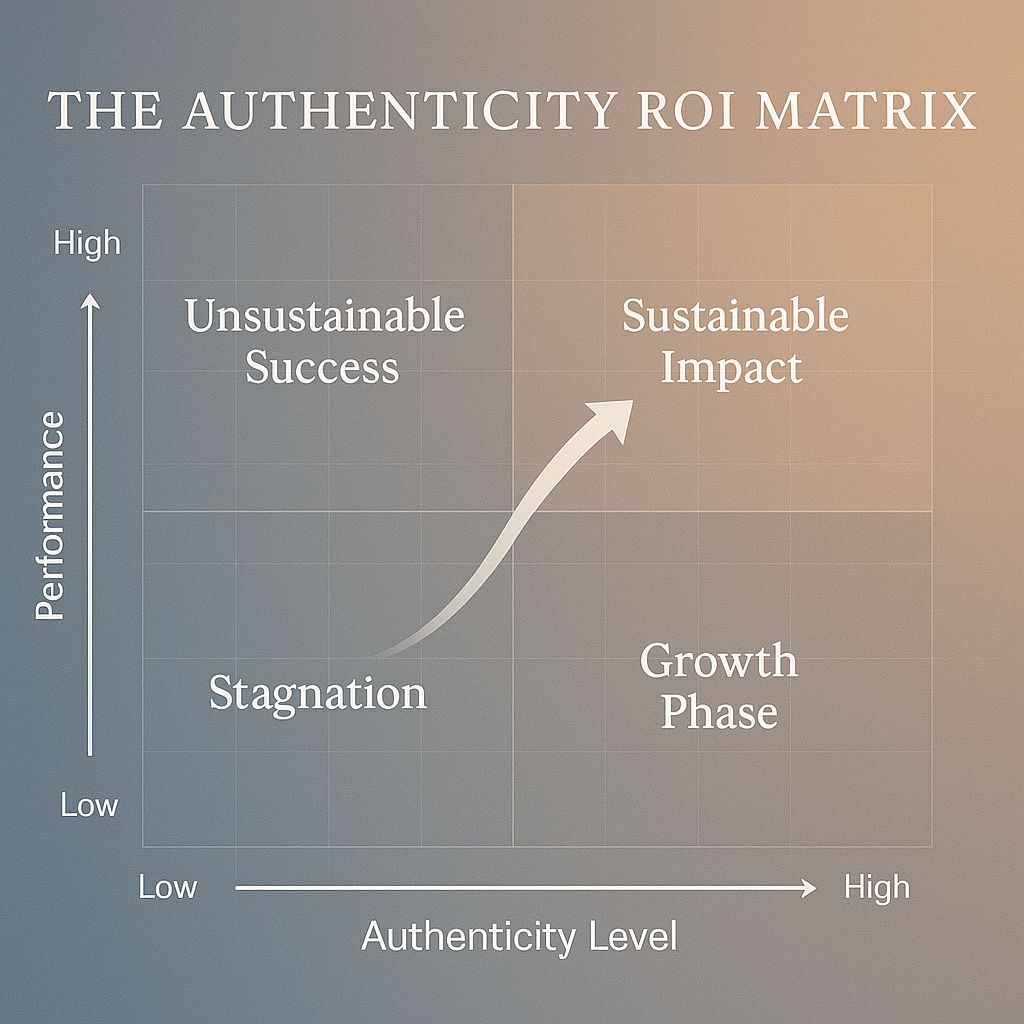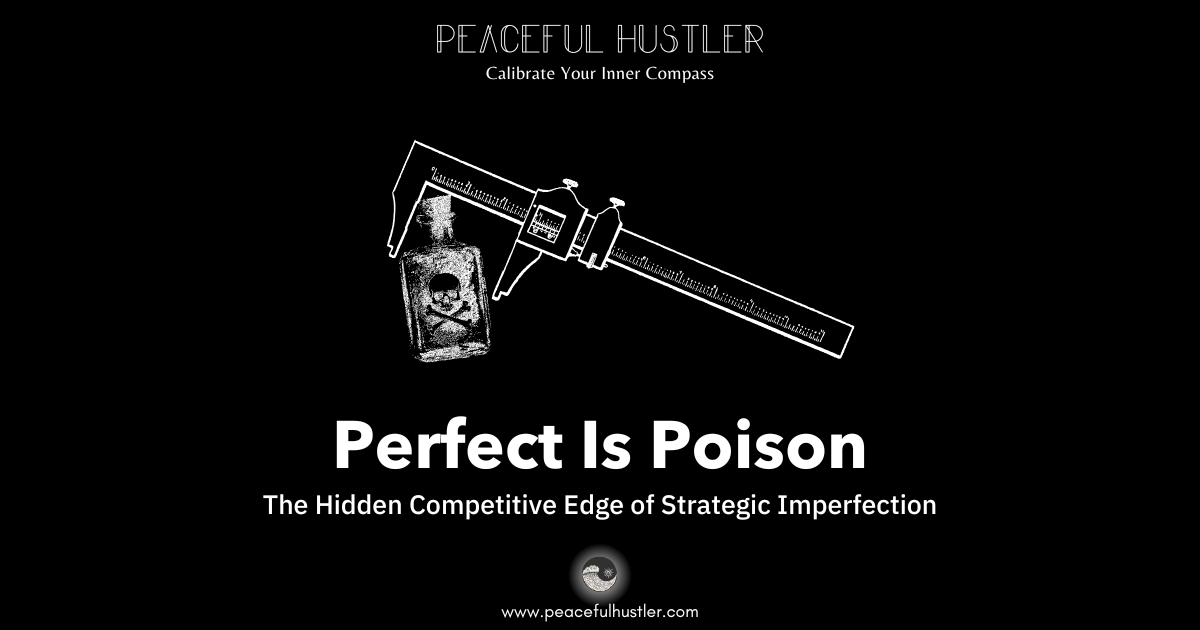THE INVISIBLE ADDICTION 🌊
You've been poisoned. Not with a substance. But with an idea.
An idea so embedded in your professional DNA that you don't even recognise it as foreign.
While you obsess over productivity hacks and morning routines, this toxin silently undermines your greatest potential.
It disguise as ambition. It portray itself as excellence. It calls itself "high standards."
But its real name? Perfectionism.
And like any good poison, it works slowly— degrading performance, eroding creativity, collapsing joy, all while convincing you it's medicine.
The most successful people you admire? They're not the most perfect. They're the most liberated from perfection's grip.
This isn't speculation. It's neuroscience. It's strategic reality.
And once you understand it, everything changes.

KEY INSIGHTS 🔑
Perfectionism isn't ambition—it's avoidance disguised as achievement
Your authenticity is your competitive advantage in an increasingly artificial world
The paradox: when you stop trying to be perfect for everyone, you become essential to someone
Real transformation happens at the intersection of vulnerability and intentionality
THE REALNESS REVOLUTION 🚀
Everyone wants to be perfect. Nobody wants to be real. That's why most people are miserable.
"Not me," you protest. "I don't chase perfection."
But look closer:
At the email you've rewritten seven times before hitting send.
At the presentation you obsessed over until 3 AM.
At the projects you've abandoned because they weren't "ready."
At the opportunities you've avoided for fear of being exposed as inadequate.
The 13th-century poet understood something we're still struggling to learn:
You were born to be real, not to be perfect.
In a world obsessed with filters, followers, and false identities, this ancient wisdom has never been more vital.
Let me show you why.
THE PERFECTION TRAP ⚠️
Most people chase perfection their entire lives. Smart people chase excellence. Wise people chase authenticity.
Here's what we rarely notice about the perfection game:
It's rigged from the start.
It's designed to be unwinnable.
It's built to keep you consuming rather than creating.
The metrics keep changing. The standards keep rising. The finish line keeps moving.
And that's no accident.
Perfection isn't a destination—it's a distraction.
THE MECHANICS OF MISERY 🔍
There are two ways to live:
The Perfection Path:
External validation
Constant comparison
Perpetual inadequacy
Endless optimisation
The Realness Route:
Self-awareness
Intentional imperfection
Strategic vulnerability
Authentic expression
The first path leads to burnout. The second path leads to breakthrough.
The difference isn't in the what. It's in the why.
The privilege of a lifetime is to become who you truly are.
THE SCIENCE OF AUTHENTICITY 🧠
When Harvard researcher Amy Cuddy studied what sets truly successful people apart, she uncovered something unexpected:
It wasn’t perfectionism.
It wasn’t flawlessness.
It wasn’t even excellence.
It was presence—the ability to show up as your authentic self, aligned with your core values.
This isn't just philosophical—it's neurological.
Your brain reads inauthenticity as a threat. Pretending to be someone you’re not triggers your stress response, spikes cortisol, and drains your mental bandwidth.
Over time, it clouds your judgment and saps your energy.
But authenticity?
It’s like a neurological exhale. Showing up as you are—flaws and all—calms your stress response, boosts oxytocin in trusting moments, and sharpens your cognitive focus.
It’s why authentic leaders connect deeply and why genuine creators stand out in a filtered world.
There's a lightness that comes with authenticity— like finally removing a weight you didn't know you were carrying.
Imagine a bird, wings tied to stones for years. Cut those ties, and it doesn’t just fly—it soars. The energy once spent dragging those stones becomes fuel for heights you couldn’t dream of.
That’s the power of strategic imperfection. Not carelessness, but courage.
You’re wired to be real.
Be yourself; everyone else is already taken.

THE BREAKTHROUGH FRAMEWORK 🛠️
So how do we move from perfection to authenticity?
It starts with understanding three fundamental truths:
Truth #1: Perfection is subjective 📊 What's "perfect" changes across cultures, eras, and individuals. There is no universal standard. There is no finish line.
Truth #2: Imperfection is valuable 💎 Your flaws create connection. Your struggles build wisdom. Your edges define your contribution.
Truth #3: Authenticity is strategic 🧩 Being real isn't just morally right. It's practically advantageous. It's competitively superior.
With these truths as our foundation, here's the pathway forward:
1. Identify Your Perfection Patterns 🔎
Where are you performing rather than being?
What masks have become habitual?
When do you feel most exhausted by keeping up appearances?
2. Design Your Authenticity Architecture 📐
What values are non-negotiable for you?
What strengths are uniquely yours?
What contribution can only you make?
3. Build Your Realness Rituals ⏱️
Daily reflection on alignment
Weekly authenticity audit
Monthly values recalibration
4. Create From Wholeness, Not Woundedness 🌱
Share from strength, not insecurity
Create from purpose, not validation
Build from vision, not comparison

MY RECENT EXPERIENCE 📓
I caught myself in the perfectionism trap last week.
I was creating an AI automation workflow and became fixated on a single criterion: It had to be completely free.
This wasn't rational. This was ego.
I spent days installing community editions, learning cloud deployment protocols, configuring servers—diving deeper into technical rabbit holes with each passing hour.
And with every solution, three new problems emerged.
The rational part of me knew: I'm not a software engineer. The learning curve was exponential. The time cost was impossible to calculate.
But the perfectionist in me insisted: "Just one more tweak." "Just one more tutorial." "Just one more hour."
Then I asked myself a question I should have asked on day one: "What am I optimising for—the perfect solution or actual progress?"
I detoured. Implemented a hybrid approach with free-tier tools. Set a time limit on my tinkering. And moved forward with the core project.
The irony? By abandoning the pursuit of the perfect solution, I eventually circled back and solved the original problem— achieving both progress AND the free implementation I wanted.
Perfect wasn't just the enemy of good. Perfect was the enemy of done. And sometimes, done opens doors perfect keeps locked.

The individual has always had to struggle to keep from being overwhelmed by the tribe. To be yourself in a world that is constantly trying to make you something else is the greatest accomplishment.
When you stop trying to be perfect for everyone, You become essential to someone.
When you embrace who you really are, You discover what you're really here for.
Remember, Perfect isn't possible. But real is revolutionary.
Until next week,
love,
aayush
hustle peacefully!


